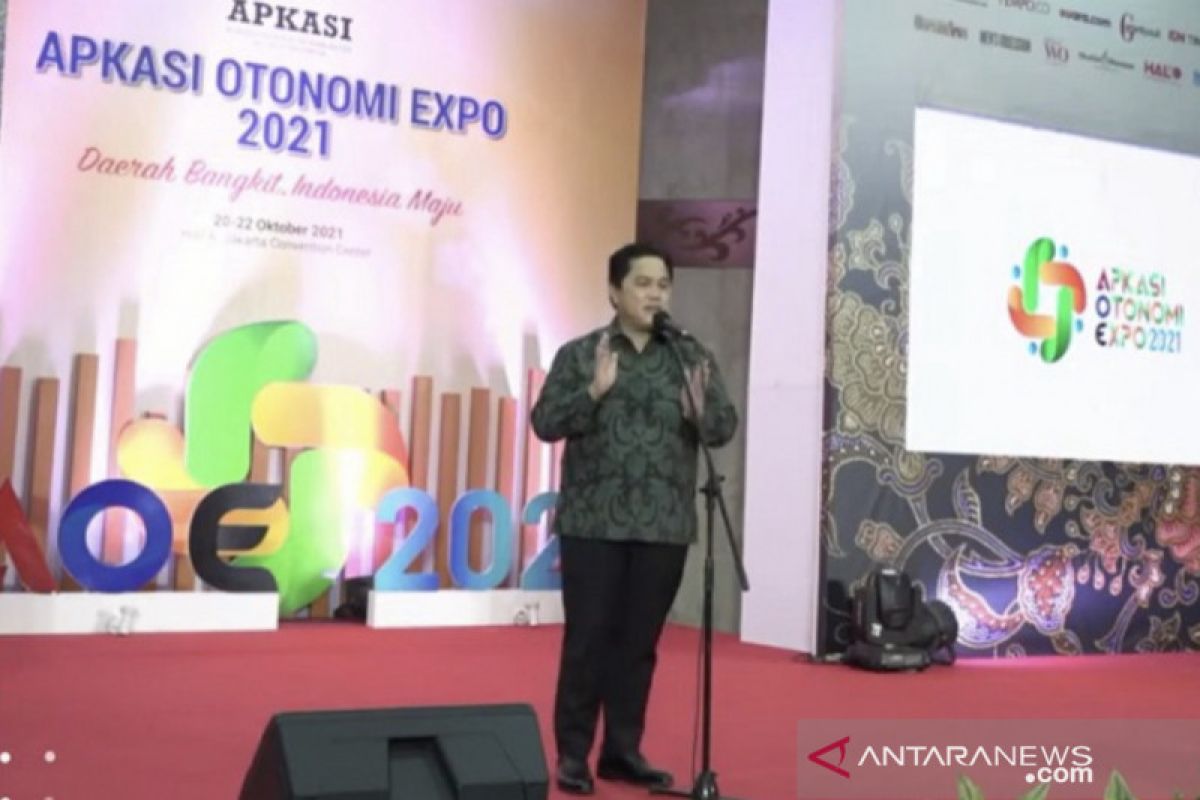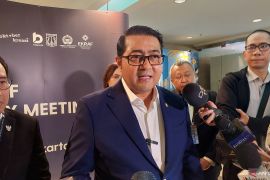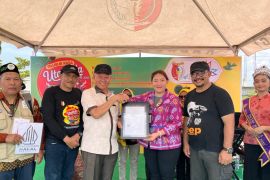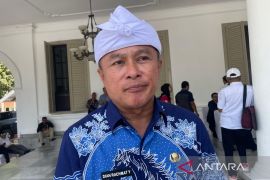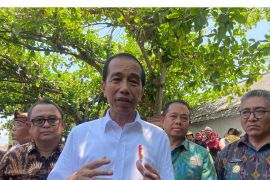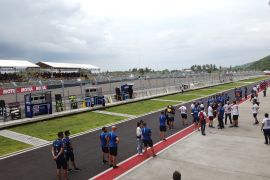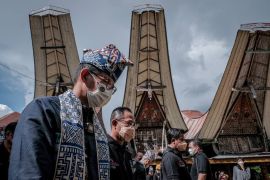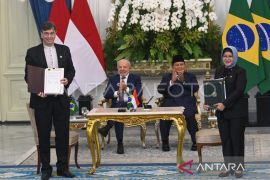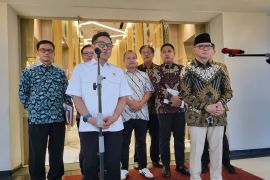Every region in the nation will need to unite under the same vision and build a roadmap to speed up recovery. A regional potential map would be equally essential for scripting a revival.
A quick recovery is what everybody is hoping for, including State-Owned (SOEs) Minister Erick Thohir, who expressed this sentiment while closing the Indonesia District Government Association (Apkasi) Autonomy Expo 2021 at Jakarta Convention Center on October 22, 2021.
Thohir declared he is ready to cooperate with district heads to revive regional economies .
Related news: Youth leverage for economic revival: ministry
Everybody is aware of the devastating impact of the COVID-19 pandemic because it shook two main pillars: health and economy, he said.
In comparison to the 1998 and 2008 crises that only affected the financial sector, COVID-19 has created a worrying gap, with the rich becoming richer, and the poor becoming poorer, he noted.
However, everyone should still believe that micro, small, and medium enterprises, and the people's economy have to be resuscitated first, he said.
To help revive the economy, Thohir said he expects the regions to create a roadmap and map their individual industrial potential.
Failure on part of regional stakeholders to map their respective regions' strength would lead to a stagnation of regional industry, he opined.
Related news: Strong cooperation is key to economic recovery in BIMP-EAGA: Jokowi
Inspiration for Regions
Regions could look at state-owned enterprises (SOEs) for ways to revive from the pandemic, Thohir said. Thus far, SOEs have consolidated under one mission to pursue a number of initiatives, he added.
First is the realization of Healthy Indonesia because the health threat will continue to emerge, the minister noted. This would require region heads to focus on ensuring quality health services at regional hospitals, he said.
Second is the realization of Indonesia Works, which would focus on creating jobs, especially for those affected by COVID-19.
Third is Indonesia Grows, which would be achieved through digital technology. E-commerce will be utilized to promote local MSMEs (micro, small, and medium enterprises) instead of being a marketplace for imported products, he informed.
Related news: Minister optimistic of Indonesia clocking 4 percent growth by 2021-end
Moreover, food and beverages industry, and other industries, must be promoted through applications, he said. The question is how can both local contents and local industry grow, he noted.
Thohir particularly urged district heads to start thinking about a road map much like what the SOEs Ministry has done through Indonesia Healthy, Indonesia Works, and Indonesia Grows initiatives.
Because only through cooperation between the central government, the regional government, the younger generations, and the general public that the nation will continue to grow as it should, he observed.
He advised district heads who have joined Apkasi to continue to focus on regional growth and develop accurate promotion venues in accordance with each regions' roadmap, he said.
His ministry is open to cooperating with district heads through programs that can be adjusted in relation to its investment and strategy.
Related news: COVID-19 fueling trend of street performers in Bali: sociologist
Discussion Forum
The Apkasi Autonomy Expo 2021 should become a reflection of district heads' dedication to gather and unite their vision so that their respective regions can revive from the pandemic together, Thohir said.
Meanwhile, executive director of Apkasi, Sarman Simanjorang, noted that the event this year was still lively despite the pandemic.
Eighty-five participants, including 75 district governments, 4 ministries, 2 provincial governments, 1 SOE, and 8 private entities took part in the event, he informed.
The event showcased the potential of regional products through 140 stands and attracted eight thousand visitors, including the general public, investors, and related agencies, he said.
The event's Executive Dialogue featured speakers such as Trade Vice Minister Jery Sambuaga, he added. This dialogue is expected to expedite regional economies, which is a responsibility of all parties, he said.
Related news: Latest research indicates digital platforms drive economic recovery
The expo also served as a meeting hub for all stakeholders, whether policymakers or entrepreneurs, he added.
Simanjorang also pointed out that Apkasi Autonomy Expo 2021 also featured discussion forums and meetings on reviving the national and regional economies.
Investors and representatives from district governments, the Indonesian Chamber of Commerce and Industry (Kadin), and Indonesian Young Entrepreneurs Association (HIPMI) took part in the events, he said.
There was also a business matching event where buyers and investors could connect with one another.
The virtually held activity was participated by 25 district governments and 18 corporations from KADIN, HIPMI, and others, Simanjorang said.
The event also showcased the Apkasi Procurement Network, where private providers of goods and services within the government can meet with Regional Governmental Apparatus Organizations (OPD), he added. This is aimed at allowing regional governments to form partnerships with entrepreneurs, he explained.
Miss Region Autonomy Award was also presented at the event, he informed. The award was given on the basis of how the younger generation performed various duties to promote commodities, the investment climate, and tourism to the broader public, he said.
Related news: Minister optimistic of Indonesia clocking 4 percent growth by 2021-end
At the event, the Apkasi Journalistic Award was also presented as a form of appreciation for journalists who care about spreading information regarding regional development through innovative works and encourage constructive solutions for regions' advancement, Simanjorang said.
The theme for the journalist writing competition was 'Revival of Regional Economy in Supporting National Development', and winners were named in a number of categories such as the Online Media Category, he disclosed.
All these activities were aimed at expediting efforts to recover the national economy by reviving the regional economy through investments and increasing economic transactions, he said.
Meanwhile, chairman of Apkasi, Sutan Riska Tuanku Kerajaan, said that he hoped the event would immediately revive the regional and national economies.
Related news: Strong cooperation is key to economic recovery in BIMP-EAGA: Jokowi
The regional economy can revive through the Apkasi Autonomy Expo 2021 in accordance with President Joko Widodo's mandate, he noted.
In the end, everyone has the choice to provide their biggest contribution in creating a nice investment climate in regions, such as through providing assurance in permits and ease of doing business, he said.
This is because economic recovery in regions is inseparable from the efforts of every stakeholder within the cycle of the economy, including the private sector, SOEs, and regional government-owned enterprises.
If optimal efforts are made, the expected revival can truly be realized.
Related news: Environment Ministry anticipates forest fires despite La Nina
Related news: Saving Indonesian university students from drug abuse, addiction
Editor: Fardah Assegaf
Copyright © ANTARA 2021
